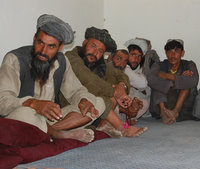As Gen. David Petraeus takes over the U.S.-led mission in Afghanistan, he is right to continue a strategy of counterinsurgency and to strengthen it with a plan that seeks to give local Afghan communities the means to defend themselves. However, both the recently announced local defense plan, which pays community members to don a rifle and police uniform, and the over-arching counterinsurgency of which it is a part take the wrong path to reducing violence in Afghanistan.
As Secretary of Defense Robert Gates said in 2008, the U.S. "cannot kill its way to victory." Yet, the Pentagon has emphasized "providing security to the people," in counterinsurgency parlance, primarily by defending them or, in the case of this new local defense force, by arming them. This is not enough to resolve the problems that have allowed insurgents to thrive in the first place, which require political solutions that change the very conditions that facilitate the insurgency.
However, there is one initiative that, because it does focus on the social and political factors that drive insecurity, shows the most promise for permanently ending the insurgency: the Local Defense Initiative.

